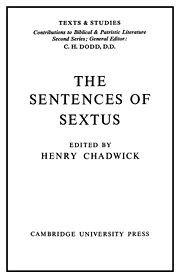2 - THE EVIDENCE OF ORIGEN
Published online by Cambridge University Press: 04 August 2010
Summary
The earliest testimony to the existence of the Sextine collection comes from Origen, writing in the late forties of the third century a.d. On two occasions he cites from the maxims explicitly naming Sextus as their author. We shall shortly see that these two occasions are not the only instances where Origen can be shown to be quoting from the collection. But all discussion of the origin, date, and character of the collection must of necessity begin from these passages. They must now be examined.
The first passage (Contra Celsum VIII, 30) occurs in the course of Origen's reply to Celsus' criticism of the Christian refusal to eat sacrificial meat. The context is of some interest. There was nothing in Christian custom that seemed to the pagan mind less reasonable than the Church's refusal to permit participation in an innocuous meal where the food provided consisted of meat that had been previously offered on the altar of a pagan sacrifice. Celsus comments that the Christian usage could be defended on logical principles if the Church wholeheartedly adopted the vegetarianism of the Pythagoreans and abstained from all forms of animal food without exception; but merely to single out certain kinds of meat for abstinence is irrational.
Origen's reply is remarkably interesting because it reveals the characteristic strength and weakness of the Christian position in this regard.
- Type
- Chapter
- Information
- The Sentences of Sextus , pp. 107 - 116Publisher: Cambridge University PressPrint publication year: 1959

